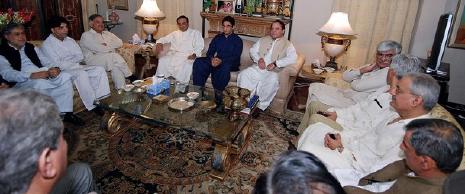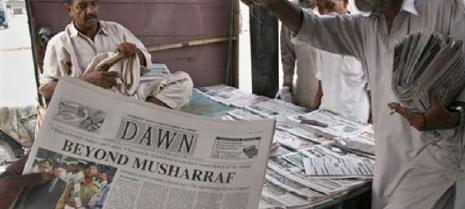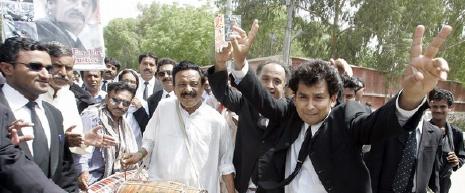Adil Najam
One of the most important decision in Pakistan’s political history was made yesterday when Gen. Pervez Musharraf was made to resign from the Presidency. Equally, and possibly more, important decisions are being made right now by the political leadership of the ruling coalition. It is these decisions being made now that will ultimately effect not only the immediate but the long-term future of the country and which will, in many ways, determine the real significance of the decision made yesterday.
As the political leadership of the country continues its deliberations four questions in particular seem critical. The answers they come up will will impact what happens to Pakistan politics as well as what happens to Pakistan’s political leadership itself.
On each of the following four key decision points, what do you think will happen? What do you think should happen?
![]()
Question #1. Who will replace Gen. Pervez Musharraf as President of Pakistan?
The names being thrown around, some I think less seriously than others, include those of Afsaryab Khattak, Afsandyar Wali Khan, Fazlur Rahman, Dr Fehmida Mirza, Aftab Shaaban Mirani, Faryal Talpur, Attaullah Mengal, Saeeduz Zaman Siddiqui, Mehmood Achakzai, Aitizaz Ahsan, Rana Bhagwandas, Fakharuddin Ibrahim, and many others. As important as the choice of the President is the signal it will send about whether the nature and powers of the President will also be cut down or not. What do you think will happen? What do you think should happen?
Question #2. Will Chief Justice Iftikhar Chaudhry and his fellow judges be restored? And when?
The really important question here is the “when”. PML(N) wants the judges to be restored immediately. If they are not, what signal will this send to the PML(N) and the country about their role and power within the ruling coalition? What, really, are the pros and cons of an early restoration, and for whom? The one question that may be even more important than the “when” question here, is the “under what conditions” question. That is the question one hears less about but will may ultimately determine what comes, or does not come, out of the judges moevement. What do you think will happen? What do you think should happen?
Question #3. What is the future of the ruling coalition itself?
The ruling coalition was really constructed as a coalition against Gen. Musharraf. Its primary purpose was to remove Gen. Musharraf from office. It has been spectacularly successful in doing that. What now? Will it survive? In what form? Should it survive at all? Will it be more healthy if PML(N) now becomes a parliamentary opposition which, in a functioning democracy, is as important as a government? What do you think will happen? What do you think should happen?
Question #4. What about the survival issues of the Pakistani awam: Bijli, Paani, Nokri, Naan?
Ultimately, this is the most important question of all. Till now, with a visibly divided government, the political parties could ward of part of the economic woes faced by ordinary Pakistanis to Gen. Musharraf and his past policies. Now, they will have to – and quickly – demonstrate that they can and will do something about these major crises. It is not clear what they plan to, or even can, do. But if they don’t their popularity will be seriously imperiled. What do you think will happen? What do you think should happen?






















































The resolution will collpase in National Assesmbly.
Zardari have made it loud & clear.
Restoration of Judiciary is eminenent
LESS
Iftekhar Chohdary & Khalil Ur-Rehman Ramday
Take it or LEAVE IT.
So Nawaz Shareef have a choice ! either way,
Cheers !
I wonder a President elected from NA and Senate votes is the same as one elected from a public referendum. Obviously seeking validation from a referendum after assuming power as President is not very democratic.However if you do it before assuming office you can be elected democratically through a referendum on the nominees from public.
@Pakistani !
Hahah dude get a life! Are you a moderator of this post. Get a life and stop behaving like a child.
Ahmad good responses Faraz good questions, but tribal or fuedal whats the difference same crap no need to over analyse this please.
As I said forget musharref, nawaz, bhutto I really dont care about that at all! I need a stable Pakistan and Democracy is good but also its not a virasat of 2 famlilies. Aik jata hai doosra ata hai!
Someone commented to me silly joke or azad poetry. I dont have time if you have you can do.
Bottom line, I want a stronger better Pakistan and I dont see that happeneing if these 2 people are in power or these parties.
Plus again some guy here commented to my post that I am supporting a person well I am not. Musharref mayra chacha nahin hai, jo her waqt us ki support karna zaroori hai. Even if the current government can do good I dont care as long as they show little respect to the poeple of pakistan and not to there pockets!
Me again. Sorry, forgot the last part of your last set of questions:
> Are NS and Zardari not the last two people you would want to run this country?
>>> The first of this is not a question it is your opinion. I may share it as an opinion, but asa fact neither you nor I know if it is true or not. Nor can we know. Actually, to think about it, I can think of MANY worse people than them. Think hard, and so may you.
> Will it get better in the future, given the dynastic nature of politics (Bilawal being a recent example of this).
>>> I have no way of knowing. Nor do you. Conceptually, there is no reason to assume that Bilawal will either be better or worse or even similar to his mother or father. That can only be determined from performance and performance will only become evident when he has position. So all of this is sheer speculation. One can, of course, learn from history. John Quincy Adams turns out to be as good (and some say better) President than his father John Adams. Indira Gandhi was as good (and some say better) than her father. Asad Amanat Ali Khan was not as good as his father but he was still very very good. So, yes, in many cases having parents in the same field can obviously help. But in politics you have to prove yourself eventually. So, again, the basic proposition you are making is wrong.
Unfortunately, I am going to disappoint you – because you will not get the answers you expect (your question structure still makes it very easy to discern what answers you seek). Anyhow, let me give it a shot… just to amuse you:
> Large areas of Pakistan are still under the feudal system. If that